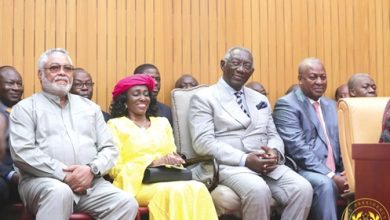
The Chief Executive Officer (CEO) of the Ghana Investment Promotion Centre (GIPC), Simon Madjie, has assured Ghanaians that while the country remains committed to attracting foreign investments, sectors legally reserved for citizens will be protected without compromise.
Speaking in an exclusive interview with the Daily Graphic yesterday, the CEO emphasised that Section 27(1) of the Ghana Investment Promotion Centre (GIPC) Act, 2013 (Act 865) clearly barred foreigners from engaging in petty trading and other businesses strictly preserved for Ghanaians.
His assurance follows the three-day ultimatum issued by the Abossey Okai Spare Parts Dealers Association to foreign traders to cease retail operations and restrict themselves to wholesale supply only.
Mr Madjie further explained that the GIPC Act did not only prohibit foreigners from petty trading, but also from engaging in services such as selling in markets and shops, operating sachet water businesses, retailing pharmaceutical products, printing basic stationery, running taxi services with fewer than 20 to 25 vehicles, and managing all forms of lotteries except football betting.
Fronting, enforcement
On enforcement, the GIPC boss admitted that institutional bottlenecks, particularly the phenomenon of “fronting”, remained a major setback.
The practice, Mr Madjie explained, involved Ghanaians renting out their shops or stalls in their names and passing them on to foreigners to enable them to trade in restricted sectors.
“The biggest bottleneck has been fronting. It has made it very difficult to deal with the issue.
Our intention is to increase a lot more education in and around that.
We believe that the more we know about the issues, the easier it is for us to build a strong wall against it and to get people to really reform,” he stated.
Mr Madjie stressed that while the GIPC played a central role in compliance monitoring and education, enforcement primarily laid with district assemblies, their security committees and other state agencies such as the Immigration Service and the Ministry of Trade, Agribusiness and Industry.
New bill
The GIPC CEO disclosed that the new GIPC bill, currently under consideration, would introduce administrative fines as a direct sanction against offenders.
Unlike the existing framework, which relied on lengthy court processes, the administrative fines were designed to serve as effective deterrents, he stated.
Additionally, the bill proposed the creation of a national register of all investors and businesses across the country to improve monitoring.
Abossey Okai ultimatum
On the Spare Parts Dealers Association’s threat to take matters into their own hands, the GIPC CEO appealed for calm.
He urged traders to allow the appropriate authorities to manage the situation, pointing out that some traders perceived as foreigners might, in fact, be Ghanaians.
“People have to also understand that the GIPC law also allows for the spouses of Ghanaians who have been married for five years or more and can prove that, to actually go into areas that are reserved for Ghanaians.
So the person may not have a name or may not speak like us, but they may be Ghanaian citizens,” he explained.
Mr madjie disclosed that the GIPC had already engaged the leadership of the Ghana Union of Traders Association (GUTA) and the Abossey Okai spare parts dealers to establish a complaints desk and enhance public education campaigns to protect reserved sectors.
“I sympathise with you about what’s happening. I spent time in the markets so I understand that it is a question of competition in an area reserved for Ghanaians. But the solution is not for them to take the law into their own hands. It is for us to sit down to get the right authorities to act.
“At GIPC, we are not clothed with the power to close down shops or determine who is a citizen or not. It ought to be the appropriate task force,” he said.
Investment climate, obligations
Touching on the country’s international obligations, Mr Madjie, a lawyer and trade and investment facilitator, explained that while the country remained a member of ECOWAS and the World Trade Organisation (WTO), those protocols still allowed governments to reserve certain economic areas for citizens.
He explained that the country’s broader investment drive as per the President’s vision, especially in technology, commercial agriculture and high-end services, remained intact, with the government easing minimum capital requirements in selected areas to attract more investors.
“Ghana is open for business. His Excellency’s vision is to bring back many of the businesses that have left.
So, the removal of the minimum capital requirement in the $200,000 and $500,000 category is to encourage investment which will improve our skill set and create a lot more jobs for our people,” Mr Madjie stated, explaining that the President was not talking about areas that were reserved for Ghanaians.
Partnership
The GIPC CEO also appealed to the media, particularly the Daily Graphic, to support public education campaigns on the provisions of the GIPC Act.
“Greater understanding of the areas that are reserved for Ghanaians will really help all of us to protect them and not allow a few of us to go about fronting and bringing in persons who will not be in it to be in it and participating to create this problem.’’
Background
Last Monday, the Abossey Okai Spare Parts Dealers Association issued a three-day ultimatum to foreign traders in the country’s largest spare parts retail market, demanding that they ceased engaging in what they described as “petty trading” and restrict their operations to wholesale supply only.
At a press conference in Accra, the General Secretary of the association, Gifty Lovelock Naana Fianu, said the activities of foreigners in the spare parts enclave contravened Section 27(1) of Act 865.
Ms Fianu further accused foreign traders of undercutting local businesses by exploiting irregular trade practices, including evading duties and importing goods through unofficial channels.
She said the influx of foreign traders into the retail space had left Ghanaian small and medium enterprises (SMEs) struggling to survive under harsh conditions, compounded by high financing costs.



